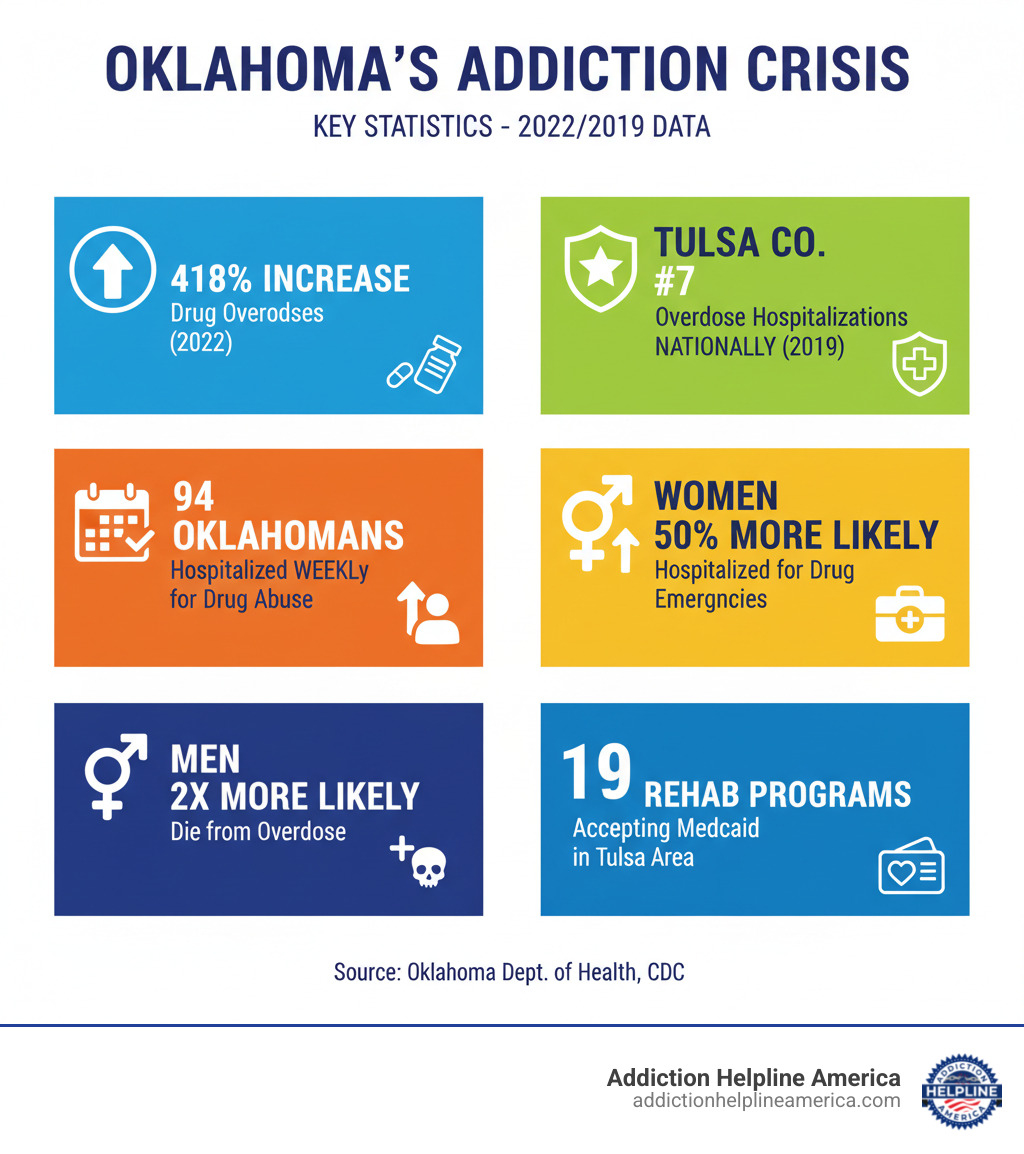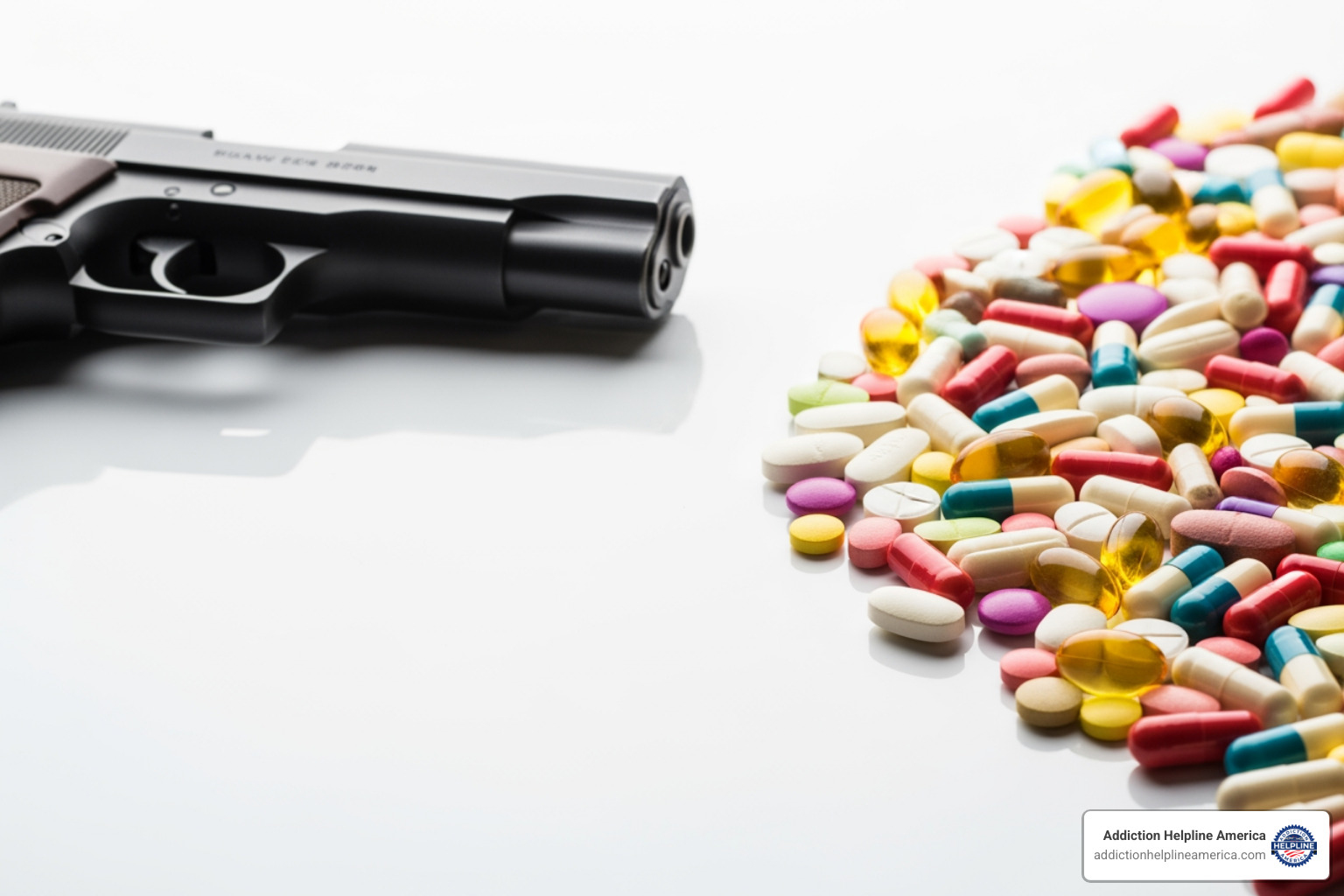
Understanding Your Options for Rehab in Tulsa
Rehab in Tulsa offers a range of addiction treatment options for individuals and families affected by substance abuse. Here’s a quick overview:
Quick Answer: Types of Rehab in Tulsa
- Medical Detox – Safe, supervised withdrawal with 24/7 medical care.
- Inpatient/Residential Treatment – 30-90 day structured programs with comprehensive therapy.
- Outpatient Programs – Intensive Outpatient (IOP) and Partial Hospitalization (PHP) for flexible care.
- Dual Diagnosis Treatment – Integrated care for co-occurring mental health conditions.
- Specialized Programs – Services for women, adolescents, veterans, and other specific populations.
Common Payment Options: Private insurance, Medicaid (19 facilities), Medicare, sliding scale fees, and self-pay.
The need for effective addiction treatment in Tulsa is urgent. Oklahoma saw a 418% increase in drug overdoses in 2022, and Tulsa County has had one of the highest overdose hospitalization rates in the country. With 94 Oklahomans hospitalized for drug abuse every week, these aren’t just statistics—they’re our neighbors and family members. But there’s hope. Recovery is possible with the right support.
At Addiction Helpline America, we help individuals and families steer the process of finding addiction treatment. Our experienced counselors understand the Tulsa treatment landscape and can connect you with programs that match your specific needs, insurance, and circumstances.
Rehab in Tulsa terminology:
Understanding Tulsa’s Addiction Landscape
If you live in Tulsa, you’ve likely felt the ripple effects of the addiction crisis. Rehab in Tulsa isn’t just a service—it’s a lifeline for thousands in our city.
The numbers tell a difficult story. In 2019, Tulsa County had the seventh highest overdose hospitalization rate in the entire country. Opiates drove one in five of these cases, while prescription anxiety medications like benzodiazepines accounted for 15% of overdose hospitalizations.
Every week, 94 Oklahomans are hospitalized because of drug abuse. Our emergency rooms see this crisis firsthand, and our healthcare workers are stretched thin trying to respond.
The crisis also impacts genders differently. Women in Tulsa County are 50% more likely to be hospitalized for drug-related emergencies, while men are twice as likely to die from an overdose. These differences highlight the need for specialized treatment approaches.
Tulsa also ranks 72nd nationwide for overall drug use rates, showing that addiction touches every corner of our city.
But there’s good news: Oklahoma has laws in place to help people get support without fear.
The Good Samaritan Overdose Prevention Law is a critical protection. If you call 911 for someone who is overdosing, you’re protected from certain legal consequences. This law saves lives by removing the fear that prevents people from seeking emergency help. First responders carry Narcan, a medication that can reverse opioid overdoses, but they can only help if someone makes the call.
Oklahoma’s Mental Health Parity laws ensure that insurance companies must cover mental health and substance abuse treatment just as they cover physical health conditions. This means getting help at a rehab in Tulsa shouldn’t be harder, from an insurance standpoint, than getting treatment for a broken bone.
These legal protections show that Oklahoma recognizes addiction as a health issue, not a moral failing. Recovery is possible, and the system is increasingly designed to support those ready to take the first step.
The 5 Core Types of Addiction Treatment Programs in Tulsa
Finding the right rehab in Tulsa starts with understanding the available types of treatment. The journey to recovery is unique for everyone, so different programs offer different levels of care. Let’s walk through the five core treatment types you’ll find in Tulsa.
Medically-Supervised Detox: The First Step to Safety
Before healing can begin, your body must safely clear itself of substances. This process, or detox, is a critical first step. Attempting to detox alone can be dangerous, as withdrawal from alcohol and benzodiazepines can cause severe complications like seizures. In a medically-supervised detox program, you are monitored 24/7 by medical professionals who manage discomfort and respond to any complications.
Medication-Assisted Treatment (MAT) is often used, especially for opioid addiction. MAT combines FDA-approved medications (like Suboxone or Vivitrol) with counseling. These medications reduce cravings and withdrawal symptoms, increasing the chances of success. Once you are stable, you can fully engage in therapy.
Inpatient/Residential Rehab: A Structured Path to Healing
Inpatient or residential rehab in Tulsa offers a complete break from your daily environment and triggers, allowing you to focus entirely on healing. You live at the facility, typically for 30 to 90 days, in a highly structured environment. Days include individual counseling, group therapy, and holistic approaches like yoga, meditation, or art therapy. One of the most powerful aspects is the peer support from living alongside others on the same path, which reduces isolation and builds community.
Outpatient Programs: Flexible Treatment for Your Life
If you can’t put your life on hold, outpatient rehab in Tulsa provides effective treatment while you live at home. Intensive Outpatient Programs (IOPs) involve several hours of therapy per week, while Partial Hospitalization Programs (PHPs) offer more intensive, full-day programming. The benefit of outpatient care is that you practice recovery skills in real-world situations, learning to face triggers while maintaining sobriety. You can continue working and caring for your family, and these programs generally cost less than inpatient care.
Dual-Diagnosis Treatment: Addressing Co-Occurring Disorders
Addiction rarely exists in isolation. It’s common for substance abuse to co-occur with anxiety, depression, PTSD, or other mental health conditions. This is called a “dual diagnosis.” Treating only one condition while ignoring the other is rarely effective, as they often feed off each other. Dual-diagnosis programs provide integrated care that addresses both your substance use disorder and mental health condition simultaneously. This includes a psychiatric evaluation and a coordinated treatment plan that may involve medication management and therapies like Cognitive Behavioral Therapy.
Specialized Programs: Custom Rehab in Tulsa for Specific Needs
Effective treatment recognizes that your background and identity matter. Many rehab in Tulsa facilities offer specialized programs for specific populations.
- Women-only programs create safe spaces to address issues like trauma, parenting, and relationship dynamics. Some programs, like Palmer Addiction Recovery Services, allow mothers to bring their children.
- Adolescent and young adult services use age-appropriate approaches, often incorporating family therapy and educational support.
- Veterans’ programs address challenges like PTSD, military sexual trauma, and reintegration into civilian life. The Eastern Oklahoma VA Health Care System offers these services.
- Faith-based options integrate religious principles with treatment, such as combining the 12 steps with Christian principles.
- Native American programs provide culturally sensitive treatment that respects and integrates Native American traditions and healing practices.
These programs are effective because they honor who you are and address your specific challenges, making recovery more likely.
Navigating the Logistics of Finding a Rehab in Tulsa
Finding the right rehab in Tulsa involves understanding the practicalities of payment, admissions, and long-term support. These logistics can feel overwhelming, but they are manageable.
How to Pay for Rehab in Tulsa
Worrying about cost is a major barrier to seeking help, but many payment options exist. The average cost of treatment in Tulsa is around $52,085, which is lower than both the state and national averages.
- Private health insurance: Thanks to Mental Health Parity laws, most insurance plans cover addiction treatment. About 13 facilities near Tulsa accept private insurance. Always verify your specific benefits with your provider or the facility’s admissions team.
- Medicaid and Medicare: For those with limited income, 19 rehab programs near Tulsa accept Medicaid. Medicare also covers some addiction treatment services, particularly for older adults.
- Sliding scale fees: Many centers adjust costs based on your income, making treatment more affordable for those without robust insurance.
- Self-pay and cash: 14 facilities near Tulsa accept self-pay. Many will arrange payment plans to fit your budget.
- Scholarships and financial aid: Some non-profits and government grants (like SAMHSA block grants) offer financial assistance. It never hurts to ask an admissions team about these options.
At Addiction Helpline America, we can help you understand your coverage and explore financial solutions.
The Admissions Process: What to Expect
The admissions process usually starts with a confidential phone call to a potential rehab in Tulsa. An admissions counselor will conduct an initial assessment to understand your substance use history and mental health needs to ensure the program is a good fit. The team will also handle insurance verification for you, explaining your coverage and any out-of-pocket costs.
Upon arrival, you’ll complete intake paperwork, including medical history and consent forms. You’ll typically need to bring a photo ID, insurance card, comfortable clothing, and basic hygiene products. Personal electronics are often limited to help you focus on recovery. Admission requirements vary by program; for example, some inpatient programs require patients to be medically stable and able to participate in daily therapy.
Our team at Addiction Helpline America can guide you through each step, making the process as smooth as possible.
Aftercare and Long-Term Recovery Support
Completing rehab is a huge accomplishment, but it’s the beginning of the journey, not the end. Sustainable recovery requires ongoing aftercare to help you transition back to daily life.
Relapse prevention planning is a key part of aftercare, helping you develop strategies to identify triggers and cope with cravings. Sober living homes offer a structured, substance-free environment that provides a crucial bridge between intensive treatment and independent living. Many programs also offer continuing care options like weekly group therapy or alumni programs to keep you connected to a recovery community.
Support groups are a powerful tool for long-term recovery. Tulsa has a robust network of peer-led groups:
- Alcoholics Anonymous (AA) and Narcotics Anonymous (NA) meetings are available throughout the city, offering the well-known 12-step approach.
- SMART Recovery (Self-Management and Recovery Training) is a science-based alternative that focuses on self-empowerment and cognitive-behavioral techniques.
- Dual Recovery Anonymous (DRA) provides specialized support for those with co-occurring mental health conditions.
Family support is also vital. Groups like Al-Anon, Nar-Anon, and Parents of Addicted Loved Ones (PAL) provide education and community for family members.
Explore Tulsa rehab options with Addiction Helpline America. We’re here to help you find the right treatment and aftercare resources for long-term success.
Frequently Asked Questions about Addiction Treatment in Tulsa
Taking the first step toward recovery brings up many questions. Here are answers to some common concerns about rehab in Tulsa.
How long does rehab typically last?
Treatment length depends on your unique situation, including the severity of the addiction and any co-occurring mental health issues.
- Short-term programs typically last 28-30 days. They can be effective for those with a strong support system or whose addiction was caught early.
- Long-term programs extend from 60 to 90 days or longer. Research shows that longer treatment durations often lead to better long-term outcomes, as they allow more time to address root causes and build coping skills.
- Outpatient program duration varies. A PHP might last four to six weeks, while an IOP could continue for several months, with sessions tapering off over time.
The best treatment length is the one that meets your specific needs. Many programs offer flexibility to extend treatment if necessary.
Will I lose my job if I go to rehab?
This is a common fear, but federal laws exist to protect you when you seek help for addiction.
The Americans with Disabilities Act (ADA) protects individuals in recovery from workplace discrimination. Employers are often required to provide reasonable accommodations, which can include time off for treatment.
The Family and Medical Leave Act (FMLA) allows eligible employees to take up to 12 weeks of unpaid, job-protected leave for medical reasons, including addiction treatment. Your job (or an equivalent one) must be available upon your return.
Your privacy is also protected by the Health Insurance Portability and Accountability Act (HIPAA), which ensures your health information remains confidential. Most residential facilities do not permit remote work, as recovery requires your full, distraction-free attention. Speaking with your HR department can help you understand your company’s policies and your rights.
Can I get a loved one into rehab if they refuse?
Watching a loved one refuse help is painful. While recovery works best when a person chooses it, you are not powerless.
Voluntary treatment is the most effective, but the choice to enter rehab is often driven by serious consequences, like legal trouble or ultimatums from family. This external pressure can be the catalyst for change.
- Professional interventions: A trained interventionist can facilitate a structured conversation where loved ones express their concerns and present a clear path to treatment. This can break through denial in a loving, non-confrontational way.
- Setting healthy boundaries: Refusing to enable the addiction (e.g., by providing money or housing) is a crucial act of love. Boundaries protect you and can help your loved one face the natural consequences of their actions.
- Family support resources: Groups like Al-Anon and Parents of Addicted Loved Ones (PAL) offer guidance and emotional support from others who understand your situation.
- Legal options in Oklahoma: In extreme cases where someone is a danger to themselves or others, Oklahoma law allows for involuntary commitment for substance abuse treatment. This is a complex legal process and is typically a last resort.
Approach your loved one with compassion, not judgment. Keep the door to conversation open, as it may take multiple attempts before they are ready to accept help.
Conclusion: Your Path to Recovery Starts Today
If you’re reading this, you’ve already taken a courageous step. Simply searching for information about rehab in Tulsa shows hope.
We’ve covered the different types of treatment available, from medical detox and inpatient care to flexible outpatient programs and specialized services. You also now understand the logistics of paying for treatment, the admissions process, and the importance of aftercare support through sober living and groups like AA and NA.
Here’s the truth: recovery is possible. We’ve witnessed it thousands of times. People facing the same struggles you are have found their way to healthier, happier lives. The path isn’t always easy, but it is worth it.
At Addiction Helpline America, we understand that finding the right treatment is overwhelming. That’s why we’re here. Our counselors provide free, confidential guidance to help you steer your options. We know the Tulsa treatment landscape and will work with you to find a program that matches your needs, insurance, and circumstances. You don’t have to do this alone.
The statistics are sobering, but behind every number is a person who deserves healing. Don’t let fear or uncertainty stand in the way of a brighter tomorrow.
Your path to recovery starts now. Reach out. Ask for help. Take that first step.
Our helpline is 100%
free & confidential
If you or someone you care about is struggling with drug or alcohol addiction, we can help you explore your recovery options. Don’t face this challenge alone—seek support from us.
Programs
Resources
Will my insurance
cover addiction
treatment?
We're ready to help
Find the best
drug or alcohol treatment
center
Are you or a loved one struggling with addiction? Call today to speak to a treatment expert.
















